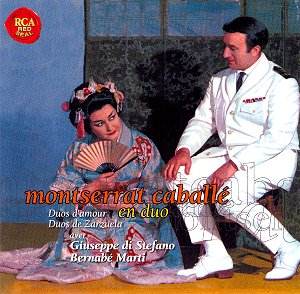I have already reviewed two of these
double-CD albums (Grandes héroïnes
lyriques and En récital)
which bring together the early records
made by Montserrat Caballé in
Spain, for the Vergara label in the
early 1960s and for Columbia a decade
later. I gave an enthusiastic welcome
to both of these, the first of which
was dedicated to operatic arias, the
second to artsong. I enjoyed the present
album much less.
Montserrat Caballé
met Bernabé Marti in 1962 while
performing Madama Butterfly and the
two were married in 1964, shortly before
making the present disc. Apparently
Caballé declined to sing the
role with any other tenor. Itís a touching
story, but love is not enough to transform
a middle-ranking provincial tenor into
an international artist such as Caballé
herself was rapidly becoming. Could
she really not hear this? Marti has
a robust baritonal tenor, well-placed
and steady, and thus far so good, but
there is no flexibility in his phrasing
and not even a real legato. In addition,
this recording seems to have been made
in a different venue from the others
in the series, which are perfectly acceptable
for their date, for the acoustic is
very dry, with the voices a long way
forward, rather in the manner of an
early Cetra. Even Caballé herself
suffers from this; her "morbidezza"
is rarely in evidence and her ringing
security is transformed into a ghetto-blaster.
I think both singers were fighting against
a heavy-handed conductor, but since
the engineers have relegated the orchestra
to the far distance the two singers
are left high and dry, relentlessly
bellowing for no apparent purpose.
In 1964 Caballé
performed for the first time with a
classier tenor: Giuseppe Di Stefano:
Itís a pity they waited ten years to
make this disc, for by 1974 the celebrated
artist was well past his best. Some
of the quieter phrases are still nicely
turned but above a mezzo forte he sounds
jaded and hoarse and is often flat.
Much of this is really painful to the
ear, reminding us that 1974 was also
the year of his dismal world tour with
the declining Callas, the recordings
of which have tactfully never been released.
The Donizetti obviously strains him
least but even so it was a relief to
turn to his 1961 performance under Gavazzeni
(I have highlights of this on LP, I
donít know if the performance is available,
officially or otherwise, on CD). Even
then his "fioriture" were
clumsy compared with those of Caballé
(or Scotto, his partner in 1961) when
the same phrase passes from one to another,
but at least he still had a likeable
timbre and some sense of style. Caballé
herself has some exquisite moments but
this is not enough.
Returning to Marti
after this for the Zarzuela extracts
I began to feel that this singer had
his points after all Ė at least the
voice is more youthful and in evident
good health. Furthermore, the more reverberant
recording presents him in a more favourable
light and the music itself hardly calls
for more than a generalised ardour.
These Zarzuela pieces are firmly in
what might be called the "international"
operetta style, warmly Léharesque
in manner. I was a little surprised
that they did not sound more Spanish,
in the way that Johann Strauss sounds
Austrian, Offenbach sounds French and
Sullivan sounds English, particularly
when at least one of the composers,
Guridi, sounds thoroughly Spanish in
much of his other music. Is this why
the Zarzuela has not travelled more
extensively outside Spain? However,
it is all very pleasant, and maybe more
than that if you understand what is
going on Ė no texts, translations or
even synopses are provided. No doubt
Internet will provide texts for most
of the opera duets, but not for these.
This latter omission
puts the tin lid on as far as any recommendation
is concerned; just what do you get for
your money? Hectoring opera duets with
Marti, embarrassing ones with Di Stefano
and some nicely done Zarzuela pieces
which, under the circumstances, can
only be recommended to those who know
Spanish.
Christopher Howell
MONTSERRAT
CABALLÉ: Grandes héroïnes
lyriques
Montserrat
CABALLÉ en récital: Recital
"Los Encores"
Montserrat
CABALLÉ EN DUO - Duos de Amor
Montserrat
CABALLÉ: Récital espagnol


